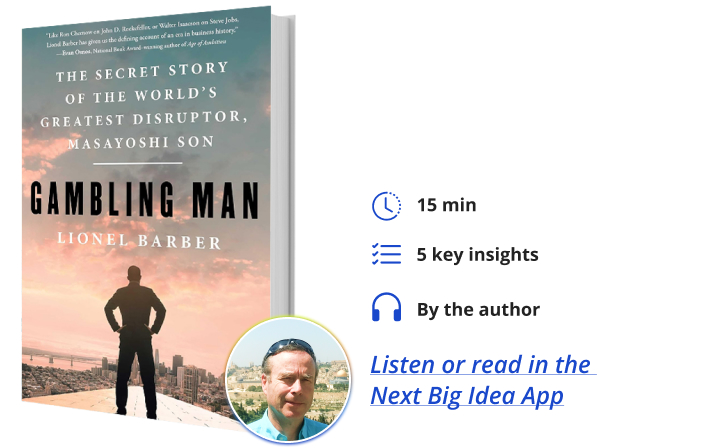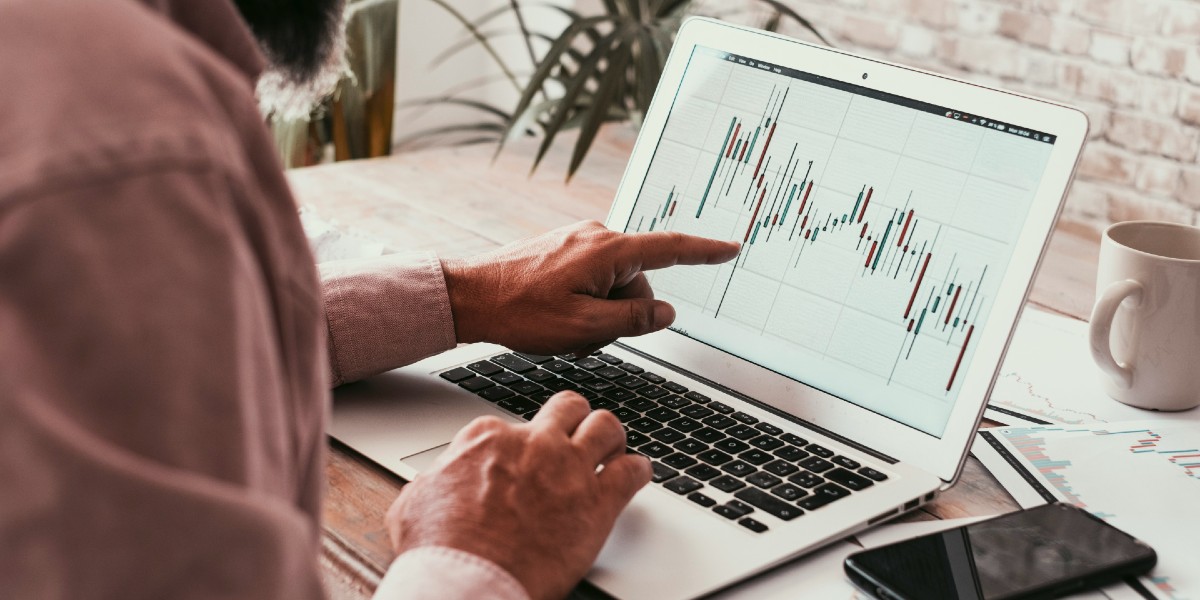Lionel Barber served as editor of the Financial Times for 15 years, overseeing award-winning journalism and the digital transformation of the publication. During his tenure, he interviewed leaders in business and politics, such as Presidents Barack Obama and Donald Trump, Russian President Vladimir Putin, Chancellor Angela Merkel of Germany, and Indian Prime Minister Narendra Modi. He has also served on the board of Trustees at the Tate and the Carnegie Corporation of New York.
What’s the big idea?
Often underestimated and written off by Western media, legendary investor Masayoshi Son became (and remains) a somebody—after starting life as a nobody. His story demonstrates remarkable grit and versatility in the face of progress and challenges. How he leans on his strengths and adapts to weaknesses shows masterful action toward achieving one’s potential.
Below, Lionel shares five key insights from his new book, Gambling Man: The Secret Story of the World’s Greatest Disruptor, Masayoshi Son. Listen to the audio version—read by Lionel himself—in the Next Big Idea App.

1. Turn adversity into a weapon.
Masayoshi Son was born in 1957 on the edge of a shanty town on the island of Kyushu, the second son in a Korean-Japanese family. His father was a bootlegger, pig breeder, loan shark, and owner of pachinko gambling parlors. Son’s life story is how to become somebody—perhaps the most consequential tech investor of the 21st century—when you are born a nobody.
From his earliest years, Son faced prejudice and discrimination. But, watching his father, he learned how to hustle. But instead of joining his father’s underworld gambling empire, he left Japan at age 16 to study in California. It was a liberation. At college, including three years at UC Berkeley, where he majored in economics, he witnessed the personal computer revolution.
On his return home, Son set up a software distribution business called SoftBank, the foundation of his future global media-tech conglomerate. Then, aged 24, he was diagnosed with Hepatitis B and given three to five years to live. He had a young daughter, and his wife was pregnant with their second child. Thanks to pioneering treatment, Son survived, just as he has survived several brushes with corporate death: During the dotcom boom, the global financial crisis, and the COVID pandemic.
Son is a study in perpetual re-invention, but also resilience in adversity. Despite his wealth and fame, he remains distrusted by Japan’s corporate elite, chiefly because of his ethnic Korean background. But he has used his outsider status as a powerful motivating tool in his quest to be number one.
2. Ask for money and get advice. Ask for advice and get money twice.
Son is known in Japan as “the old man killer.” His charm and self-belief endeared him to a succession of veteran businessmen and engineers who made decisive contributions to his success.
The first was Den Fujita, a bilingual Japanese interpreter for General Douglas MacArthur after World War II. Fujita persuaded McDonald’s to award him the company’s first fast-food franchise in Japan (Makudonarudo). He gave the teenage Son two great pieces of advice: learn English and focus on computers, the industries of the future.
“His charm and self-belief endeared him to a succession of veteran businessmen and engineers who made decisive contributions to his success.”
Another mentor was Tadashi Sasaki, the legendary Japanese computer scientist known as Dr. Rocket. In 1981, when Son was unable to get a bank loan to launch his first business, Sasaki, head of research at Sharp, the consumer electronics giant, offered to mortgage his own house as collateral. Sasaki remained a guardian angel until his death at the age of 102.
By far, Son’s most important mentor and collaborator at Apple was Steve Jobs. Son met Jobs in the mid-1980s at the Comdex trade fair (which he later bought from Las Vegas casino billionaire Sheldon Adelson, another key relationship). In 2006, Son secured an exclusive deal to distribute the iPhone in Japan. He claims he designed the emoticons and other features of the smartphone. Whatever the truth, the distribution deal turned SoftBank into the country’s number one mobile phone operator.
3. Don’t be fooled: a middleman can make big money.
Masa did not invent, control, or own a breakthrough technology. He was not supported by U.S. venture capital, private equity, or the capital markets. Unlike China’s tycoons, he has never been a card-carrying member of the communist party. Instead, he has acted as a bridge between the U.S. and Asia, a gateway to the mass markets of Japan and China.
Being an effective middleman means being able to play both sides of the coin. Throughout his career, Son has been careful not to make enemies. For more than a decade, he navigated a complex “Golden Triangle” relationship between SoftBank, Yahoo, and Alibaba in his role as banker, consolidator, and kingmaker. At the end of several head-spinning financial maneuvers, Yahoo!’s co-founder Jerry Yang told Son: “I feel like your ATM machine.”
Son has made big money spotting bottlenecks in the age of the internet. He has inserted himself between wholesaler and retailer (software distribution), consolidated the telecoms market (Sprint and T-Mobile merger), or disrupted incumbents (NTT in Japan). For four decades, Son has made himself a nearly indispensable part of the tech ecosystem. Profitable businesses like Yahoo!, Broadband, and SoftBank Mobile gave him the platform to spin the roulette wheel in global tech investing.
4. Vision without execution is hallucination.
Thomas Edison’s warning is sometimes lost on Son. A dazzling tech visionary, he has made and lost several billion-dollar fortunes. Alongside the big wins (Yahoo!, Alibaba, and ARM Holdings), he has nursed heavy losses (WeWork, Wag, and WebVan). At times, he has been guilty of credulity.
WeWork’s Adam Neumann left him spellbound with his vision of building a world champion in the office leasing space. Son’s multi-billion investment fits a pattern of seemingly irrational decisions to splurge mind-blowing sums on founders he’s barely met or spoken to. (One British tech founder flew to Tokyo hoping for a $50 million investment. Son gave him $500 million in the blink of an eye). Such high-risk, high-reward moonshots are the stuff of venture capital. But in venture capital, a lot of bets do not pay off. Start-ups go bust. But Son refused to let WeWork fail and ended up losing $14 billion.
“The most lucrative investment of Son’s illustrious career has been a curse as much as a blessing.”
Son’s greatest strength is also his greatest weakness. If he can visualize something, it must be true. The closest analogy is Ronald Reagan and his unshakeable belief in a Star Wars anti-missile shield. Son spent his life in pursuit of another Alibaba. Hence the irony: the most lucrative investment of Son’s illustrious career has been a curse as much as a blessing.
5. Hide your strength, bide your time.
Son has made a virtue out of being underestimated. In Western media, he is often dismissed as a Yoda figure: a diminutive Japanese man with half-baked American English who likes to play the Joker.
In reality, Son is a deeply serious figure who spends every waking hour plotting his next business moves in the utmost secrecy. For a decade, he stalked ARM Holdings, one of the top British technology companies and a world leader in advanced chip designers. Then, he pounced in the summer of 2016, “when most bankers are on holiday,” he told me.
After his biggest corporate setbacks, Son has often withdrawn from public view. Ostensibly, he is serving penance. In fact, he’s plotting his next comeback. During the COVID pandemic, he made a succession of wild bets on options trading, losing several billion dollars in a matter of weeks. Then, he solemnly declared he was handing over the reins to his chief financial officer. The press wrote him off. So did some of his business friends (who urged me to get my biography written before Son went bankrupt).
In actuality, Son was focused solely on investment targets in artificial general intelligence—a long-standing passion. In 2024, he paid $500 million in a funding round for Sam Altman’s Open AI. He is now selling down stakes in his 550-strong investment portfolio in search of “deep AI” targets. Son is back at the top table of investors, staging his fifth and most serious business comeback.
To listen to the audio version read by author Lionel Barber, download the Next Big Idea App today:
































